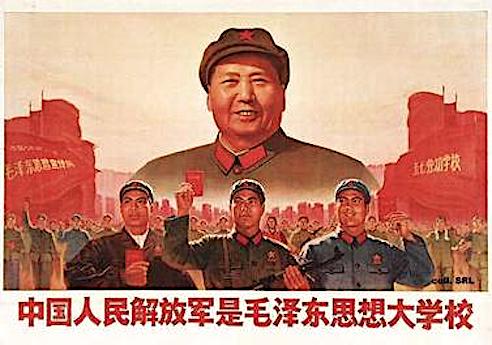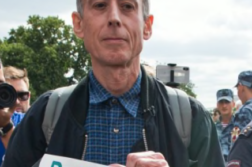TIAN HUA, a teacher of English literature in Shanghai, was a pioneer in the wave of Chinese students heading for America in the 1980s. I met him after his arrival in 1981 at a college in New York State. Following a lecture, Tian (not his real name) lingered to ask a question, then a second. We became friends. He visited me in Boston and we went sightseeing to New York. He was a lovely young man. I smile, three decades later, to depict his large eyes, masculine hands, and jet-black hair.
Tian Hua’s father worked for Chiang Kai-shek’s anti-Communists in the 1940s, but he became a professor of economics at Fudan University in Shanghai in the 1950s. His mother, too, was a university teacher. From Mao Zedong’s first hunt for political enemies in 1957, the Anti-Rightist Movement, the family was harassed as “capitalists.” Did his father own stocks? Was his mother rich? Neither true. But two sons’ lives derailed. “My brother was sent west to Muslim Xinjiang,” Tian said. “He lived like Robinson Crusoe.”
Matters worsened during the idiotic Cultural Revolution (from 1966) as Mao found his socialism disappointing and needed scapegoats. Marauding Red Guards ransacked the Tian family house in Beijing. “Got any gold?” one sneered. “Where are your American dollars?” cried another, upturning a mattress. They found none of either. This did not halt the bullying and beating.

After his parents were silenced as “class enemies,” some neighbors jumped on the bandwagon. Professor Tian fossicked in Beijing streets for bits of food, brushing back leaves at his feet as he looked for something to eat. Hostile neighbors watched. Once, when Tian Han came from Shanghai to see his parents in Beijing and found his mother ill in bed, rolling in pain, there was no money to see a doctor. “The neighborhood committee, boss of the street, had taken nearly all our funds,” Tian explained. “It was a pretext for supervising us.” He never forgot these slights.
Because of “bad” family background, Tian couldn’t join the Communist Youth League or, later, the Communist Party, even had he wished. “It was as if here, in Cambridge, your son was not allowed to join the Boy Scouts,” he said, “or to attend college.”
What did Mao achieve by pulling puppet-strings to unleash this chaos? His class foes both real and imagined lost their jobs and some, their lives. Score one goal for Mao. A more sinister outcome of the Cultural Revolution was wreckage to Chinese people’s behavior. To locate a fresh “enemy” was to earn glory.
Sadly, Tian may have been singed by the bonfire of damaged character that resulted when injustice from above prevailed. Some (not all) victims came to embrace negative values as their own. Once when I told Tian a cleaning person was coming to my place on Broadway, after I left to lecture at Harvard and he went shopping, Tian said: “How can you trust a cleaning lady with a key, to come to your apartment by herself like that?”
Tian had suffered, and I felt for him and believed him. Still, a consequence was his suspicion of many things. “My passport to come and study in U.S. was delayed a month,” he told me. “I think people at the Foreign Languages Institute in Beijing blocked me. Out of competition, they raised again the issue of my family background.” As we walked around “your beautiful Harvard,” as he called it, Tian said: “I can’t seem to find out the truth. That is why I think it may be better to believe in God.”
One evening in New York, we dined at the Harvard Club on West 44th Street and afterwards went upstairs to our room with two single beds. After a long day, I fell asleep. Suddenly Tian sprang out of his bed and into mine and lay flat on top of me. It was like an attack. But aggression was not my friend’s intent. Anyway, we were both half naked. I said gently, managing a smile, “In America, Tian, guys don’t approach each other quite like that.” But Tian’s motive was affection. Both of us had sensed a mutual attraction. The attack, while a surprise, was fine with me . For many Chinese, this kind of lovemaking had to be furtive, stolen from the evening.
Tian taught me that disliking Mao and liking the West were not two sides of one coin. He was an elitist, finding many features of the U.S. vulgar, including TV commercials. He looked at black people, I’m sorry to say, as folks from another planet. One day after we disagreed about American culture on a couple of points, he murmured: “You just haven’t been through what I’ve been through.” Of course, it was true. Another day in New York, he amused me by looking up at Manhattan skyscrapers and saying: “They really look quite old, some of them, even to a Chinese.” Tian loved Chinese tradition, preferring historic Beijing to modern Shanghai.
Shen Chunyi, a 28-year old man with short-cropped hair and solid build, came to the West a decade later than Tian Hua. For him, sex and Western ways were closely interrelated. “We knew that in the West a hug leads on to sex,” Shen said of the assumptions of his upbringing. “But we regarded it as a capitalist activity.” Two years of study in Australia changed his view of capitalism and of sex. Back in Beijing, Shen and a young lady spent the night in a borrowed room. He told me next day, “I was amazed, Ross, it’s really so easy.”
When we traveled together in Sichuan Province, Shen Chunyi met a pretty young woman. She came back to his room at Chengdu Hotel for the afternoon. Later, at dinner, Shen told me this gaudy female explained she was a virgin and could not do much: “I suggested one or two things and she asked each time, Why do you want me to do that?” Shen added as we ate noodles: “She didn’t know much. I replied to each question, Well, the Americans do it that way.” After they finished, she said: “Of course, Shen, you’re in foreign languages. I suppose Chinese in foreign languages become rather open-minded.”
She spoke the truth. Western ways and a Chinese man’s sexual habits had interacted in Shen’s life. He had become an autonomous individual. Tian Hua had not (yet) done so.
During the years of Mao’s crusade, people became adept at lying. A saying ran: “Wave the Red Flag to Oppose the Red Flag.” It was a way of saying the opposite of what one means. ”In the U.S.,” Tian observed in Boston, “people bad-mouth a person in private, but praise him in meetings. In China, it’s the opposite. People attack another person in meetings, but treat him kindly in private. It is something precious for us to cling to.”
Shen Chunyi was scrupulously honest, even in public, which was one reason for some troubles he had in China. He moved to the U.S., married a Japanese woman, and found success at business in Minnesota.
If Mao had understood the private-public dualism of Chinese people coping with the overpowering Chinese state, he might have realized the futility of his puppet-show Cultural Revolution. Politics was a fringe realm for ordinary Chinese, and still is for most. Loudly proclaimed public campaigns about heroes and villains have no deep space to lodge in Chinese minds. But I do not conclude that Tian and Shen were less sincere in lovemaking than we Americans.
Ross Terrill is the author of the forthcoming book Australian Bush to Tiananmen Square (Rowman & Littlefield), from which this piece is excerpted. His previous books include Mao, The New Chinese Empire, and Madame Mao.




